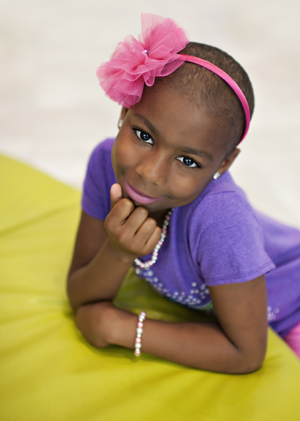
"Haniah has cancer.”
These were not words Monchel Stallins expected to hear about her active, bubbly 7-year-old daughter.
The Portsmouth first-grader was busy with school, dance lessons and cheerleading practice when her mother Monchel discovered a lump on the side of the child’s face. Antibiotics didn’t resolve the swelling, and when two more lumps appeared, more tests were ordered for Haniah.
“I knew it was something serious, but I didn’t expect cancer,” says Monchel. “When I got the call, I literally fell to the ground. I will never forget that day.”
CHKD diagnoses nearly 70 children like Haniah each year with cancer. Her disease, acute lymphoblastic leukemia (ALL), is one of the most common childhood cancers, and treatment typically includes two to three years of chemotherapy.
Prior to the 1960s, childhood leukemia was a fatal disease. Today, thanks to research taking place at hospitals such as CHKD, the vast majority of children are cured.
Haniah had
CHKD’s multi-disciplinary cancer team on her side. The team includes dedicated pediatric oncologists, highly specialized nurses, oncology pharmacists, radiologists, surgeons and dietitians. Oncology social workers and child life specialists are key members of this team, addressing the tremendous social and emotional challenges children and families face when being treated for cancer. CHKD is an active participant in the Children’s Oncology Group (COG), a collaborative research group dedicated to curing childhood cancer. Haniah and her family participated in a COG clinical trial for her leukemia treatment, helping to further advance the field of ALL research.
“We treat children with cancer using the latest protocols and clinical trials, and we never forget that they are kids,” says
Dr. Linda Pegram, a pediatric oncologist at CHKD. “Everything we do at CHKD is designed to help kids and their families navigate the challenges that come with a child’s cancer diagnosis.”
Haniah had surgery to insert a port in her chest to deliver her chemotherapy. She visited CHKD weekly for treatments, sometimes spending all day in the clinic. To pass the time, she made crafts and visited with
CHKD’s Buddy Brigade dogs. Art and music therapists set up projects for Haniah, and the hospital school staff coordinated her schoolwork so she wouldn’t fall behind.
“Haniah loved coming to CHKD,” says Monchel. “There were times I’d have to chase Haniah around the clinic to get her to leave. She didn’t want to go home.”
Preserving a patient’s childhood is one of the things that makes CHKD special, says Dr. Pegram. “Children with cancer are functioning like a typical kid in addition to fighting cancer. It takes a whole village to support them through the experience,” she says. “It’s fun to watch them grow up. The relationships we have with our patients and their families are what make our jobs so rewarding.”
Monchel says the experience has been a positive one for their family. “CHKD is full of happiness,” she says. “We’ve developed friendships with other families and have actually enjoyed our time here.”
In July, a little more than two years since her diagnosis, Haniah officially finished her treatment. To celebrate, CHKD’s cancer team gave her a signed T-shirt, and Dr. Pegram placed a medal around Haniah’s neck to recognize her achievement. It was not a goodbye party – Haniah will make regular follow-up visits to CHKD’s cancer clinic for several years to come. And, that makes Haniah smile.
“CHKD is the hospital for me,” says Haniah. “If I didn’t have to get blood tests, I would come here every day.”